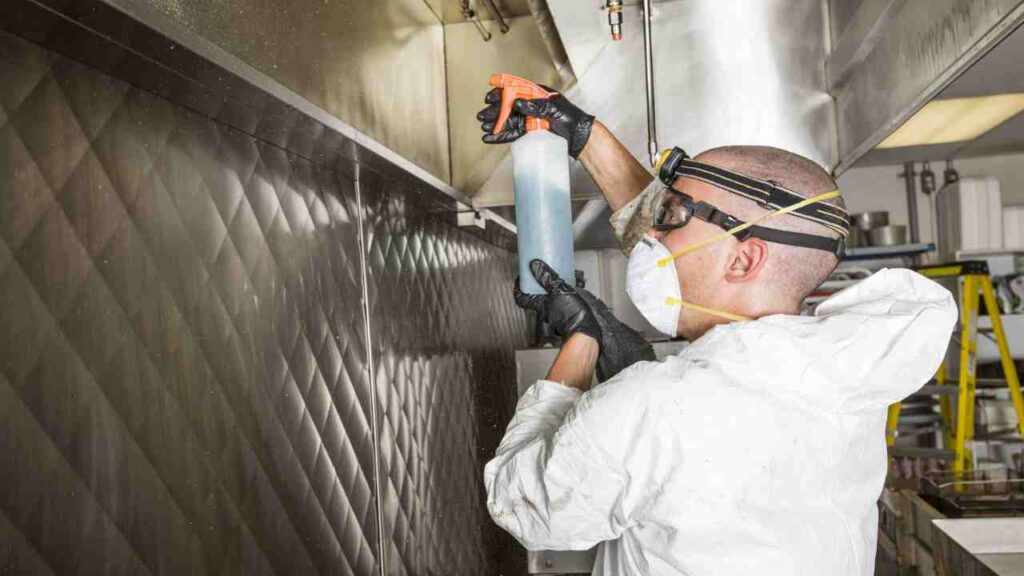Cleaning Organic Matter From Kitchen Exhaust Systems

Ontario-wide Kitchen Exhaust and Hood Cleaning – Best prices and service guaranteed.
Kitchen exhaust systems play a crucial role in maintaining a clean and safe environment in commercial kitchens. However, over time, these systems can become clogged with organic matter such as grease, oil, and food particles. This buildup not only poses a fire hazard but also reduces the efficiency of the exhaust system, leading to poor air quality and increased energy consumption. In this article, we will explore the importance of cleaning organic matter from kitchen exhaust systems and discuss effective cleaning methods.
The Dangers of Organic Matter Buildup
Organic matter buildup in kitchen exhaust systems can have serious consequences. One of the most significant risks is the potential for a fire. Grease and oil are highly flammable substances, and when they accumulate in the exhaust system, they create a perfect environment for a fire to start and spread rapidly. According to the National Fire Protection Association (NFPA), nearly one-third of all restaurant fires are caused by grease buildup in the exhaust system.
In addition to the fire hazard, organic matter buildup can also lead to poor air quality in the kitchen. When grease and food particles accumulate in the exhaust system, they can release harmful pollutants into the air, including carbon monoxide and volatile organic compounds (VOCs). These pollutants can cause respiratory problems, eye irritation, and other health issues for kitchen staff and customers.
Ontario-wide Kitchen Exhaust and Hood Cleaning – Best prices and service guaranteed.
The Importance of Regular Cleaning
To prevent the dangers associated with organic matter buildup, regular cleaning of kitchen exhaust systems is essential. Not only does it reduce the risk of fire and improve air quality, but it also helps maintain the efficiency of the system. When the exhaust system is clogged with grease and food particles, it has to work harder to remove smoke, odors, and heat from the kitchen. This increased workload leads to higher energy consumption and can result in higher utility bills.
Furthermore, regular cleaning of the exhaust system is often required by local fire codes and health regulations. Failure to comply with these regulations can result in fines, closure of the establishment, or even legal action in the event of a fire or health-related incident.
Ontario-wide Kitchen Exhaust and Hood Cleaning – Best prices and service guaranteed.
Effective Cleaning Methods
There are several methods available for cleaning organic matter from kitchen exhaust systems. The choice of method depends on the level of buildup, the type of exhaust system, and the resources available. Here are some effective cleaning methods:
1. Manual Scraping and Brushing
This method involves manually scraping and brushing off the organic matter from the exhaust system surfaces. It is suitable for light to moderate buildup and can be done using simple tools such as scrapers, brushes, and cleaning solutions. However, manual scraping and brushing may not be sufficient for heavy buildup or hard-to-reach areas.
Ontario-wide Kitchen Exhaust and Hood Cleaning – Best prices and service guaranteed.
2. Pressure Washing
Pressure washing is a more powerful cleaning method that uses high-pressure water jets to remove organic matter from the exhaust system surfaces. It is effective for moderate to heavy buildup and can reach areas that are difficult to access manually. However, pressure washing should be done by trained professionals to avoid damaging the exhaust system or causing water leakage.
3. Chemical Cleaning
Chemical cleaning involves the use of specialized cleaning agents to dissolve and remove organic matter from the exhaust system surfaces. It is suitable for heavy buildup and can be used in combination with manual scraping or pressure washing. However, chemical cleaning should be done with caution, as some cleaning agents may be harmful to the environment or pose health risks if not used properly.
Case Studies and Statistics
Ontario-wide Kitchen Exhaust and Hood Cleaning – Best prices and service guaranteed.
Several case studies and statistics highlight the importance of cleaning organic matter from kitchen exhaust systems:
- A study conducted by the University of Massachusetts found that regular cleaning of kitchen exhaust systems reduced the risk of fire by 75%.
- In a case study published by the NFPA, a restaurant fire caused by grease buildup in the exhaust system resulted in $1.2 million in damages and the closure of the establishment for several months.
- According to the Occupational Safety and Health Administration (OSHA), exposure to high levels of grease and oil in the air can cause respiratory problems, skin irritation, and other health issues.
Ontario-wide Kitchen Exhaust and Hood Cleaning – Best prices and service guaranteed.
Cleaning organic matter from kitchen exhaust systems is crucial for maintaining a safe and healthy environment in commercial kitchens. The buildup of grease, oil, and food particles not only poses a fire hazard but also reduces the efficiency of the exhaust system and compromises air quality. Regular cleaning using effective methods such as manual scraping, pressure washing, or chemical cleaning is essential to prevent these risks. Compliance with local fire codes and health regulations is also necessary to avoid fines and legal consequences. By prioritizing the cleaning of kitchen exhaust systems, restaurant owners and managers can ensure the safety of their staff, customers, and property while maintaining optimal kitchen operations.
Learn more about “Diagnosing Mistakes in Kitchen Cleaning Outlets” here.
Frequently Asked Questions about Cleaning Organic Matter From Kitchen Exhaust Systems

Why is organic matter accumulation in kitchen exhaust systems a concern?
Organic matter, primarily from cooking residues such as grease, oil, and food particles, is a significant concern in exhaust systems due to:
Fire Hazard: Organic residues, especially grease, are highly flammable. Accumulation can lead to kitchen fires when exposed to high temperatures.
System Efficiency: A buildup restricts airflow, reducing the efficiency of the exhaust system and leading to poor indoor air quality.
Health Concerns: Organic buildup can become a breeding ground for bacteria and mold, posing health risks.
System Wear: Excess accumulation can cause the exhaust system to work harder, leading to quicker wear and potential malfunctions.
What’s the recommended method for cleaning organic matter from exhaust systems?
Effective cleaning involves a combination of steps:
Regular Inspection: Regularly check for visible residues, especially around filters, hoods, and fans.
Use of Degreasers: Apply commercial-grade degreasers that can break down organic residues, ensuring they’re safe for the exhaust materials.
Hot Water and Pressure: High-pressure hot water helps in loosening and washing away the organic buildup.
Manual Scrubbing: For stubborn areas, manual scrubbing with specialized brushes may be required.
Professional Cleaning: Depending on usage, periodic professional cleaning ensures hard-to-reach areas are addressed, and the entire system is cleaned thoroughly.
How often should kitchen exhaust systems be cleaned to remove organic matter?
The frequency varies depending on the cooking volume and type:
High-volume Restaurants or Establishments Using Solid Fuels: Monthly cleaning is advisable.
Moderate-volume Cooking: Quarterly cleaning.
Low-volume or Seasonal Cooking: At least twice a year. However, regular inspections are crucial, and cleaning frequency should be adjusted based on the observed buildup.
Are there any natural cleaning agents effective against organic buildup in exhaust systems?
While commercial-grade degreasers are typically recommended, some natural solutions like vinegar and baking soda mixtures can help with light cleaning. However, for heavy organic accumulations, especially grease, stronger agents and professional cleaning methods are required for safety and efficiency.
What preventive measures can help reduce organic matter buildup in kitchen exhaust systems?
A few preventive steps include:
Regular Maintenance: Clean the accessible parts of the system, such as filters and hoods, regularly.
Quality Filters: Invest in high-quality filters designed to trap maximum organic particles and change them regularly.
Proper Cooking Practices: Ensure minimal oil splatter during cooking and use lids whenever possible.
Regular Inspections: Checking for early signs of buildup can allow for timely cleaning, reducing the accumulation.
- Cleaning Organic Matter From Kitchen Exhaust Systems
- hood cleaning
- kitchen exhaust cleaning
- restaurant hood cleaning







